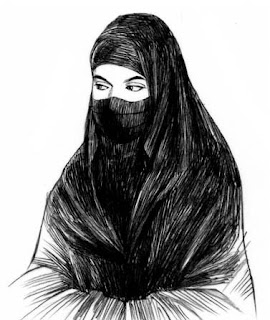What does the Quran tradition say about the veil? Published by Online Quran teacher
In the Koran, the verses cited in
support of the wearing of the veil are found in two suras, which do not
directly refer to the hair. Online Quran teacher wants to teach the people
The Koran book, photographed
during a mixed prayer led by two female imams, Anne-Sophie Monsinay and Eva
Janadin, in Paris, September 7, 2019.
The Koran book, photographed
during a mixed prayer led by two female imams, Anne-Sophie Monsinay and Eva
Janadin, in Paris, September 7, 2019. LIONEL BONAVENTURE / AFP
Does the Muslim tradition oblige
believers to cover themselves with a veil? To this question, many of those who
wear it answer yes. For them, only non-Muslims question this interpretation.
This is also the opinion of many religious authorities. What do the texts and
tradition say about it?
In the Koran, the verses cited in
support of this practice are found in two sutras (24 and 33). In the first,
verses 30 and 31 say: “Tell the believers to lower their gaze and keep their
chastity. That is purer for them. (…) And tell the believing women that they
lower their gaze, that they keep their chastity, and that they only show what appears
to be on their adornments, and that they lower their veil over their breasts;
and that they only show their adornments to their husbands, or to their fathers
(…) ”or to relatives listed in the text.
Sura 33 professes in verse 59: “O Prophet! Tell your wives,
and your daughters, and the wives of believers to draw back their great veils;
they will be recognized more quickly and free of penalty. "
How should we understand these
verses, none of which mention the hair? Tradition has questioned what is meant
by “ornaments”. Some see it as an allusion to hair, others to hands, face or
even jewelry: “There is a plethora of readings,” explains Islamologist Rachid
Benzine.
"In line with the rules of society in the VII th century"
According to him, "these texts
are in line with the rules prevailing in this society in the VII th century.
They do not introduce any major novelty. The legal culture of the Koran is
common with that of the Hebrew Bible and the Gospels. "
The Islamic scholar cites as
evidence the relationship between these Koranic lines and the recommendations
of a Christian text from the beginning of III th century the Didascalia of the Apostles : "You who are Christian, (...) if you
want to be faithful, do not please than your husband, and when you walk in the
public square, cover your head with your coat, so that the veil hides your
great beauty, do not adorn the face of your eyes, but lower your eyes and walk
veiled . "
For Rachid Benzine, the clothing
indications of the Koran are therefore not religious, but social. The
recommendations made to women to cover themselves up when going out would not
be "a sign of distinction from Muslim women." “According to the
exegetes,” he explains, “ they are aimed at women of free status so that they
are not confused with slaves” and, among them, to those of childbearing age.
Indeed, verse 60 of sura 24 allows postmenopausal women to "put down their
fabrics, but not to be seen in adornments". Online Quran teacher is the way to learn Quran.




Comments
Post a Comment